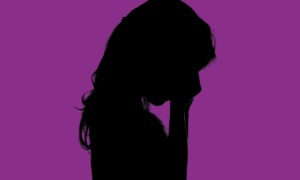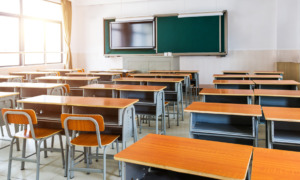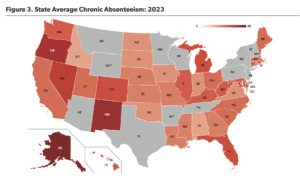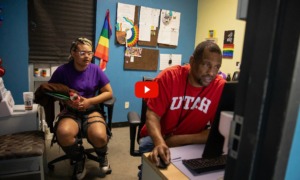 LIFE_IMAGES/SHUTTERSTOCK
LIFE_IMAGES/SHUTTERSTOCK
We are moving through historic times as our families and communities are impacted by two pandemics: COVID-19 and systemic racism. In order to work toward ensuring the safety of our children, youth service professionals working with families must be in the forefront of supporting parents and guardians by helping them maintain their physical and emotional well-being.
This intentionality can allow youth service professionals to assist parents and guardians in providing a better quality of care to their children. Thus, a model of wellness that specifically speaks to the well-being of parents and guardians, while also serving as a source of support for their children, is essential. Utilizing a model of wellness is particularly important during times of crisis and uncertainty.
The Parent Guide to Wellness Model
The parent guide to wellness model is based on Urie Bronfenbrenner’s Ecological Model of Human Development, which can serve as a valuable framework for examining the environments of parents and guardians and the interactions that occur between entities within these environments. This model consists of concentric circles that often may influence one another. Bidirectional relationships can also be formed across these circles.
A wellness model can serve as a guide for how youth service professionals help parents and guardians establish their resources and support networks while also ensuring their own holistic wellness. All the layers of the model perhaps might not align with the specific situation of the families youth service professionals may serve, but can be used as a guide to recognize natural supports and/or build beneficial relationships within their communities.
The parent guide to wellness model is presented as follows:
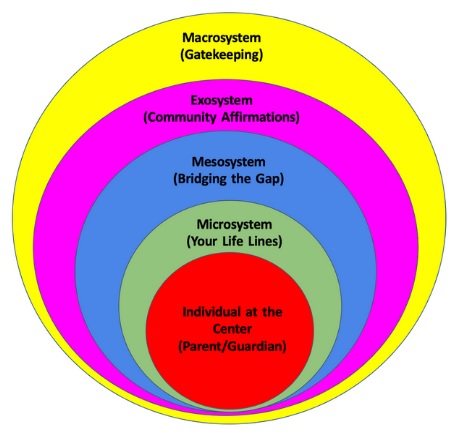
Individual at the Center (The Parent/Guardian)
Placing parents and guardians at the center of the model, think about ways professionals can help them engage in self-care activities such as reciting daily positive affirmations about themselves, utilizing gratitude journals/apps, setting boundaries or even taking a quiet moment of reflection. It is essential to help parents and guardians always keep their needs in the forefront while caring for their households.
As the saying goes, “You can’t pour from an empty cup,” so remind them to connect with themselves daily even in small ways. In simplistic terms, parents and guardians cannot be good to anyone else if they are not first good to themselves.
Microsystem (Your lifelines)
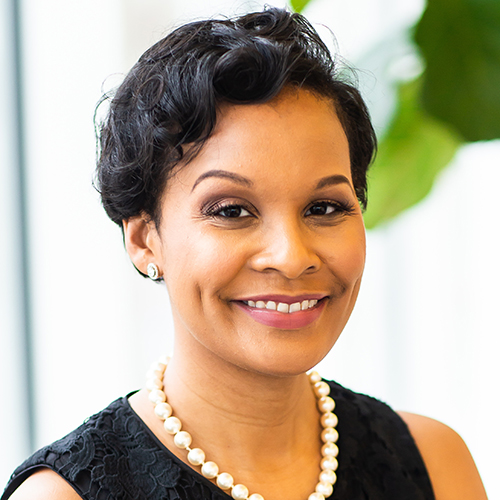
Regina Gavin Williams
Encourage parents and guardians to think about the people and resources who are the closest to them who they would rely on if they were in immediate need for support, also known as their lifelines. It is important that they have a concrete list of people and places at their fingertips for when they need respite care for their children, are in need of emotional support or reassurance that they can have life under control.
So who are those people in their lives and what resources are essential to their holistic wellness, be it their spirituality, physical and mental health, or interpersonal relationships? How are they helping to keep their cups full? Youth service professionals can assist parents and guardians in creating or building a list of supports to serve as their lifelines.
Mesosystem (Bridging the Gap)
Think about this as bidirectional relationship building between the parents and guardians and their lifelines. Youth service professionals can assist parents and guardians in recognizing that they must use their support and resources, aka their lifelines, in order to better support the emotional wellness of their families.
This is accomplished by parents and guardians introducing resources and supports for the betterment of their families. One example is to introduce children’s books that help make challenging conversations easier, such as those related to race, racism and resistance.
Exosystem (Community Affirmations)
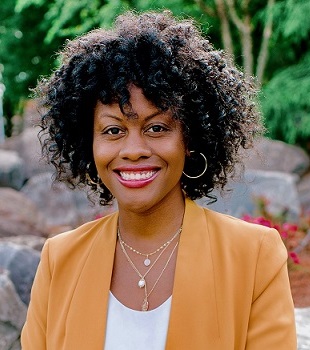
Ashley Witherspoon
This is the indirect environment of parents and guardians. How are these environments impacting them and how can youth service professionals help them to draw support from these environments? Think about their neighbors, local policies, events in their communities, safety practices, internet resources related to parenting and education and resources related to mental health and wellness that affirm their position as a parent or guardian.
Parents and guardians must use these community affirmations to their advantage. An example is introducing community resources related to anti-racism and racial justice.
Macrosystem (Gatekeeping)
Think about the social and cultural values a parent/guardian may hold. How does societal attitudes about parenting during times of crisis/uncertainty influence the way they are currently operating as a parent/guardian? What societal messages are they choosing to take in right now? Which ones are negatively impacting their ability to be emotionally well for their families?
Therefore, how can youth service professionals help parents and guardians establish healthy boundaries for themselves and their families? Youth service professionals can facilitate conversations with parents and guardians related to how the messages they internalize can directly or indirectly influence their ability to best support their children during challenging times.
As we continue to live within times of crisis and uncertainty, we are hopeful that this model will serve as a support to youth service professionals working with families. The Parent Guide to Wellness may serve as a means to help parents and guardians establish or maintain holistic wellness as they focus on providing high-quality care for their children.
Regina Gavin Williams is a clinical assistant professor of counselor education and program coordinator of higher education administration at North Carolina Central University. Her research focuses on the career and college readiness and adult self-sufficiency of adolescents aging out of the foster care system.
Ashley Witherspoon is a licensed clinical social worker and founder of Hand Made Dreams, an organization geared toward enhancing the self-image and self-esteem of female children from a multitude of backgrounds through cultural exposure, education and the integration of community, family and peer support.


